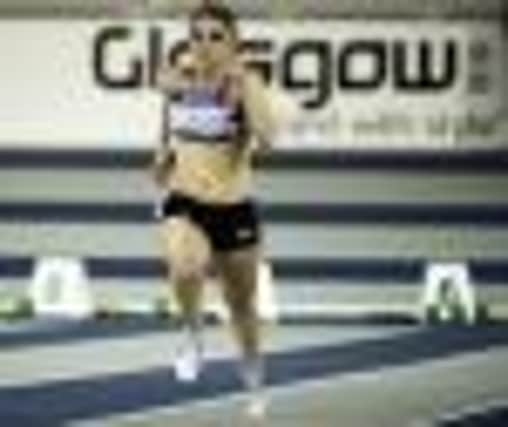Libby Clegg shows blind courage as she finishes race without guide


The last time the 22-year-old ran without a guide, she was at school and had something a lot closer to normal vision than she has now. But, when her guide runner Mikael Huggins strained a hamstring in the warm-up for the British Athletics International Match, the Paralympics silver medallist had a choice. Either run alone, or drop out of the first big event to be held at Glasgow’s new athletics venue.
With a capacity crowd of around 5,000 looking on, Clegg chose to run alone. Although she has only blurred peripheral vision in one eye as a result of an inherited degenerative condition, she often trains without a guide but running competively is a different matter. She came third out of three in the T11/12 80 metres, but simply starting and finishing was an achievement in itself.
Advertisement
Hide AdAdvertisement
Hide Ad“It’s much more difficult when I’m running at top speed without a guide,” she explained. “I can train on my own, because I’m running at 80 or 90 per cent. But, when I race, my guide is my confidence and my eyes.
“I said to Mikael when I was going to the start it felt really weird without a guide. I felt naked without him. It is completely different and, even though I train on my own, he’s vital when I compete.
“I can’t see the finishing line, so it’s a confidence thing. I don’t know entirely where I am, and he tells me that, or if I need to adapt my technique.”
Huggins was sure he had done no lasting damage to his hamstring, but, with a busy indoor season just begun, he did not want to risk a muscle tear by competing.
“Everything has been going well in training but I just had a little bit of a niggle and, with a big season ahead, I didn’t want to jeopardise anything,” he said. “It was a call that myself and Libby, and our coach, decided to make. I’m gutted, but I’m proud that she was able to still go out there and race as she did.”
Huggins took over as Clegg’s partner from his stepfather Lincoln Asquith. A former international sprinter, Asquith stayed on for a while as Clegg’s back-up guide but has now effectively retired.
The Scot will now consider recruiting another back-up, although it is doubtful whether he would be able to travel everywhere with her and Huggins.
“It’s something I’ll have to look at,” Clegg added. “Maybe it could be a bit like the track cyclists do with their pilots, and I could get some more able-bodied guys to train with us when they retire.”
Advertisement
Hide AdAdvertisement
Hide AdClegg’s race was one of four Paralympic events held in tandem with the five-team international, in which a British team making its first outing since London 2012 took on Russia, the USA, Germany and a Commonwealth select. Her Scottish team-mate Stef Reid enjoyed a successful start to the season with victory in the F44/46 long jump.
In the men’s high jump, Scottish indoor record-holder Allan Smith established a new best with a clearance of 2m23cm, a centimetre more than the mark he established just a couple of weeks ago. Smith was competing for the Commonwealth team in an event in which Team GB captain Robbie Grabarz came second.
Lynsey Sharp, just back from altitude training in Kenya, was fourth in the 800m, won by Ekatarina Poistogova of Russia. “It was slow, but I just forgot what indoors was like because I haven’t done it for so many years,” Sharp said. “I got in a bad position on the first lap and I was constantly working to try to get out of it and then I stupidly was watching the clock at the end and got pipped on the line.
“The crowd was amazing. When they introduced me I was almost crying and I needed to concentrate. It was like it was in London.”
Lee McConnell is another athlete who rarely competes indoors, as the tight bends are difficult for someone so tall to negotiate. Competing in the 200m instead of her usual distance of 400m, she was given the inside lane, and came last of five.
“It was really tough,” she said. “I thought I ran OK, but I just really struggled on the tight bends. The other girls were 200m specialists, so it was difficult for me.”
Eilidh Child, like McConnell running for the Commonwealth select, was up against her GB hurdles team-mate Perri Shakes-Drayton in the flat 400. The Londoner got the better of the duel, coming second behind America’s Natasha Hastings. Child, who has just spent several weeks doing warm-weather training in South Africa, was fourth.
The British team got off to a slow start in the 17-event competition, with world indoor champion Yamile Aldama coming last in the triple jump and Gianni Frankis finishing second last in the men’s 60m hurdles. A respectable comeback in the later events culminated in Dwain Chambers’ victory over Kim Collins in the 60m, but that could not leave the home team any higher than fourth.
Advertisement
Hide AdAdvertisement
Hide AdRussia and the USA both ended up on 58 points, with Russia winning the match by virtue of having more individual victories. It was the first time in seven years that the Russians have won the match, previously held at the Kelvin Hall.